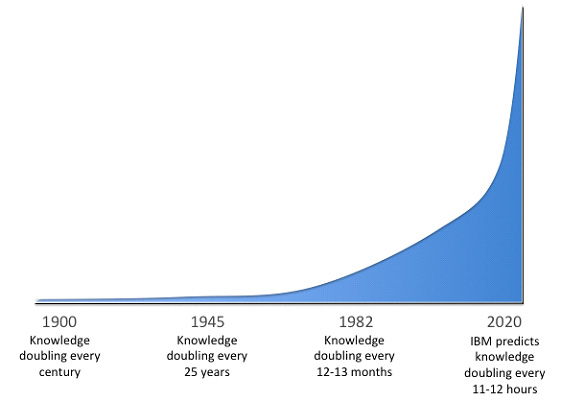by Don Gray, August 13, 2019
“The illiterate of the 21st century will not be those who cannot read and write, but those who cannot learn, unlearn, and relearn.”—Alvin Toffler
Did you hear that noise? If not, listen a little closer. What you don’t hear is the sound of everything you know becoming outdated. And that “whooshing noise” you didn’t hear? That’s the sound of new knowledge that’s come into existence since you started reading this.
In Critical Path (1982), Buckminster Fuller introduced his “Knowledge Doubling Curve.” It states that until 1900 human knowledge doubled every century. By 1945 knowledge doubled every 25 years. IBM expanded the curve through 2020 when knowledge will double every 12-13 hours. The knowledge doubling over time looks like this:

Education is the best provision for the journey to old age.—Aristotle
I still remember the elation when I walked out of my final final when finishing college. Never would I again darken the halls of a university! My formal learning ended. And my informal learning started. I’ve spent the last 35 years learning on a variety of topics, using different methods.
Opportunities to learn
Beyond degree-offering schools (universities, colleges, trade schools) I’ve used the following methods to learn:
While I’ve not personally participated in these I keep hearing about bootcamps, code retreats, and coding dojos.
The GROWS Method® is based on continuous learning via experiments, fast feedback and tracer bullet development. For your own personal learning, we recommend the following.
Regular Investment
Only you can learn for yourself. If you’re happy where you are, and want to stay there for the rest of your career, you don’t need to do anything. I hear people make good money maintaining COBOL programs. If that doesn’t work for you, then you’ll want to regularly invest in your learning. This means
S.M.A.R.T Goals
Time is precious. Have a goal for and purpose to your learning. Good goals have the following characteristics.
Diversify Topics
When the only tool you have is a hammer, it is tempting to treat everything as if is were a nail.-A. Maslow
By focusing on a single topic you can become an expert, someone who knows more and more about less and less until they know everything about nothing. My concern about becoming an expert stems from the rapid change in information. You may not have that concern.
You have many topics from which to choose. Within software development you can learn new programming languages and development environments, and new techniques such as the cloud (or whatever will replace it).
Related industries often have useful ideas to learn about. Lean, Six-sigma, kanban, value-stream mapping came to software development from manufacturing.
As the software development diagram above shows, many non-technical topics come into play. Management, teamwork, psychology come into play during software development. Knowing more about these topics can broaden your skill set and increase your value.
Plan
Plan your work. Work your plan.-anon
“Timeboxing” your goals helps, but is not sufficient for future proofing your career. You need a plan. A good plan considers the following:
To aid with your planning, you can download the Grows Learning Journal. Use it as a starting tool. As you learn more, adapt your planning tool to fit your needs and context.
In times of change, learners inherit the earth, while the learned find themselves beautifully equipped to deal with a world that no longer exists.—Eric Hoffer
I first went to an online Study Hall starting the early 1990’s in Compuserve’s Software Development Forum. We’d pick a book, read a chapter a week, ask questions, share answer and insights.
What is the GROWS Method®?
When you dig below the practices, seeds, and soil, the GROWS Method® is continuous learning. Through continuous learning people grow, products grow, companies grow.
To support personal growth we’re announcing the Study Hall 2.0. We’re going to read The Fearless Organization by Amy Edmondson. The book covers psychological safety and how it plays out in the workplace. We’ll officially start the week of 2-Sept-2019.
If this seems interesting and it fits in your learning plan, head to https://forum.growsmethod.com create a login, and join us. Look for the study hall category.
Should this not fit with your learning plan, that’s okay. The study hall members will select the next book and that may better fit with your plan. We’ll post occasional updates via this newsletter.
— Don Gray
Follow @growsmethod in the Fediverse, or subscribe to our mailing list:
Sign up for more information on how you can participate and use the GROWS Method®. We will not use your email for any other purpose.